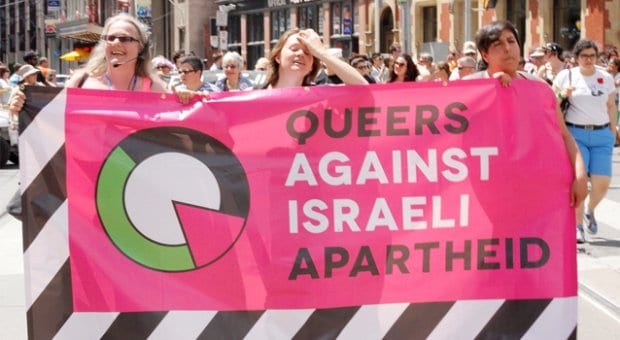Toronto Councillor David Shiner is ignoring the advice of city staff and requesting that Pride’s funding from the city be used only for “cultural elements” of the festival, such as its performance stages.
On May 28, the mayor’s executive committee approved Shiner’s motion that the funds should not be used for the parade. Shiner has previously asked council to ban the group Queers Against Israeli Apartheid (QuAIA) from marching in the parade.
Pride Toronto gets approximately $123,000 from the city in the form of a cultural grant, but none of it has ever gone toward the parade, says Pride Toronto co-chair Francisco Alvarez.
“Our grant application is for artists and performers. It has nothing to do with the parade,” he says. “We don’t think this changes anything for us. The motion doesn’t force us to ban a group. It just states, again, that everyone must comply with the anti-discrimination policy, which we have bent over backwards to do.”
Councillor Paul Ainslie, a member of the executive committee who voted against the motion, told Xtra he is “confused” by Shiner’s motion. “My understanding is the money doesn’t go to the parade,” he said. “I just let Councillor Shiner do what he wants, because he obviously doesn’t understand the process. I was surprised by it, but I just let it go.”
Shiner refused to elaborate to Xtra why he put forward a motion that effectively does nothing to change the makeup of the Pride parade. “[Lack of clarity] is a problem you have,” he said. “I was quite clear on what I said.”
Following last month’s executive committee meeting, Councillor James Pasternak offered Pride a “diversity bonus” to censor QuAIA.
Three new city staff reports have determined that the use of the term “Israeli apartheid” at city-funded events is not a criminal offence and does not contravene any city policy.
One report from the city’s solicitor advises that complaints of a legal nature must now be directed to the Human Rights Tribunal of Ontario. The report also advises councillors that the term “Israeli apartheid” does not appear to constitute hate speech.
Following the vote, many in the community took to social media, concerned that the executive committee vote is a move to axe Pride’s funding. But Alvarez says that’s inaccurate.
“If they had put language in to explicitly ban the phrase ‘Israeli apartheid,’ then that would have required us to ban the group or forgo funding, which for us would have meant defunding. But that’s not the case here.”
QuAIA member Tim McCaskell told the committee that Pride welcomes many political groups in its parade, including members of the Liberal Party, the NDP and the Conservatives. He asked whether they should also be banned.
“Conservatives have opposed every piece of LGBT legislation in Canada, including decriminalization [of homosexuality] in 1969,” McCaskell says. “Their participation offends me.”
Councillor Adam Vaughan says Shiner’s motion represents “institutional discrimination” against Pride.
“I don’t really understand what executive committee was trying to achieve today. I don’t think they really achieved very much of anything, other than unnecessarily and unfairly putting Pride through a whole different regulatory process than every other event in the city. I think Pride should be treated fairly.”
This is the third year in a row that a small group of councillors has launched an attack on Pride, calling on festival organizers to censor one specific group.
“Unfortunately for some people, Pride continues to be a target,” Vaughan says. “I don’t know if that is rooted in homophobia. I hope to god it isn’t. But if it is, it’s even more embarrassing.”
The latest threat comes one year before Toronto is set to host WorldPride, which will be one of the largest queer cultural events ever hosted in North America.
Ultimately, Vaughan says, Shiner’s motion is “pointless.” It doesn’t attempt to ban the phrase “Israeli apartheid” or force Pride to exclude any group.
“I think they have taken that [censorship] argument as far as they can take it,” Vaughan says. “Now they just want a pound of flesh out of Pride for some reason, and it has to stop. Pride is an important event of cultural significance in the city. It’s part of what Toronto is.”
Pride’s cultural grant will once again be debated on the floor of council in June, just 10 days before the start of Pride week. Vaughan is confident Shiner’s motion will not pass a full council vote.
“What happens at executive committee is just a bunch of lost souls debating things that don’t really matter much to anyone,” he says. “Council has the ultimate authority.”

 Why you can trust Xtra
Why you can trust Xtra


